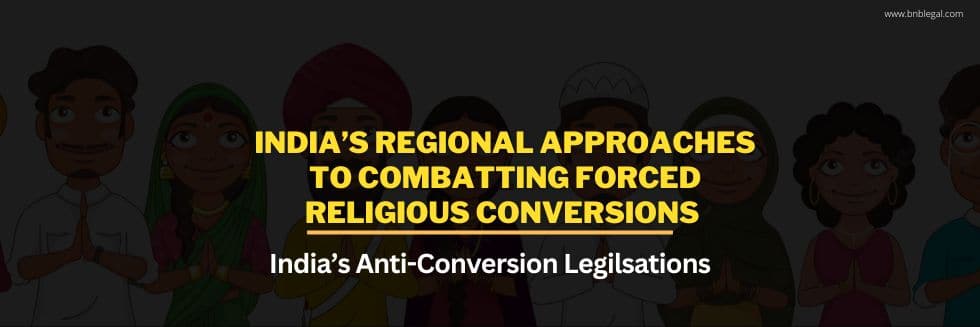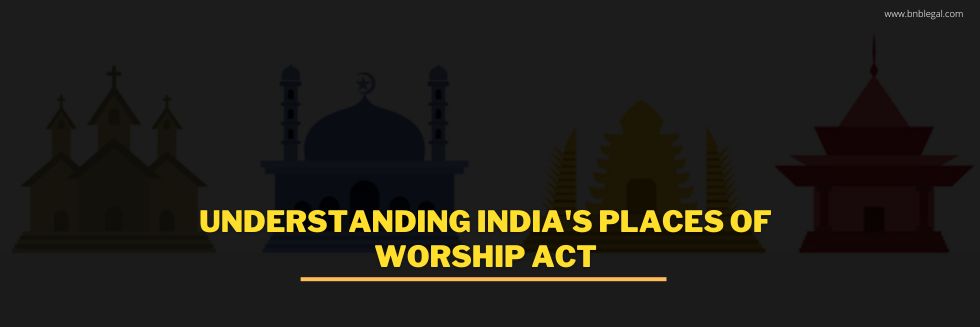Introduction
India boasts a rich and diverse religious heritage, with a plethora of major faiths coexisting within its borders, such as Hinduism, Islam, Christianity, Sikhism, Buddhism, Jainism, and numerous others. However, the nation continues to struggle with the controversial issue of coerced religious conversions. This matter causes a profound debate, with some asserting that it infringes upon an individual’s fundamental right to religious freedom, while others argue that it plays a crucial role in persuading individuals to embrace a specific faith.
What are Anti-Conversion Laws?
Anti-Conversion laws are a collection of legal regulations that limit or outright prohibit the conversion from one religious belief to another through coercive methods, inducements, or fraudulent practices. These laws delineate the penalties and fines imposed on individuals found guilty of forcibly or fraudulently inducing religious conversion. Numerous countries have instituted such laws with the intent of safeguarding individuals from being subjected to forced religious conversions. Anti-conversion laws are not aimed at prohibiting voluntary conversions but are instead designed to address coerced or involuntary conversions. These laws do not restrict conversions initiated willingly by individuals; rather, their primary objective is to penalize those responsible for compelling individuals to change their religious beliefs against their will or in a fraudulent manner.
The Current Situation Of Religious Conversion In India
While there is no federal law in India addressing religious conversions, numerous states have implemented Anti-Conversion Laws aimed at regulating and preventing coerced or fraudulent religious conversions. These laws are established to protect individuals from illegal religious conversions, particularly those involving the use of force, deceit, or inducements. As of now, ten states in India have enacted such laws, including Madhya Pradesh, Arunachal Pradesh, Chhattisgarh, Gujarat, Himachal Pradesh, Jharkhand, Odisha, Rajasthan, Uttarakhand, and Karnataka. Those found in violation of these laws can face penalties, which may vary from fines to imprisonment, depending on the seriousness of the offence.
Foreign Countries That Have Enacted Anti-Conversion Laws
Nepal
In the year 2018, Nepal introduced anti-conversion laws, which specifically forbid the use of force, inducements, or allurement to compel individuals to convert to a different religion. The majority of the population adheres to Hinduism and Buddhism and has established penalties for those found guilty of violating this law, including fines and imprisonment for a maximum term of five years. The Nepalese legislation shares similarities with certain anti-conversion laws in Indian states, as both seek to prevent coerced religious conversions and impose penalties on individuals found in breach of these regulations.
Bhutan
Bhutan, a predominantly Buddhist nation where Buddhism is widely practised, introduced an anti-conversion provision as part of an amendment to its Penal Code in 2011. This provision is outlined in Article 463A of the amended Penal Code, which addresses the act of compelling individuals to change their religion or faith through the use of coercion or inducement. Notably, the clause does not provide a specific definition for what constitutes coercion or inducement. The prescribed penalty for individuals found guilty of this offense is a three-year prison term, and it is primarily seen as directed towards cases involving Christian conversions.
Myanmar
Article 34 of the Myanmar Constitution acknowledges the principle of religious freedom, stating that every citizen has the equal entitlement to freedom of conscience and the right to openly profess and practice their religion while being subject to considerations of public order, morality, health, and other constitutional provisions. Myanmar, despite being a secular state, has a significant Buddhist majority, and Buddhist nationalism plays a dominant role in its political landscape. Under Myanmar’s legal framework, it is prohibited to engage in religious conversions with the intention of insulting, degrading, destroying, or misusing any religion. Violation of this law can result in penalties, including imprisonment for a maximum of 2 years, a fine of 200,000 kyats, or a combination of both.
Indian States That Have Enacted Anti-Conversion Laws
Madhya Pradesh
Madhya Pradesh, a state in India with a predominantly Hindu population, enacted its Dharma Swatantriya Adhiniyam (Religious Freedom Act) in 1968. It was the second Indian state to implement Anti-Conversion Laws. This legislation specifically prohibits religious conversions from one faith to another through the use of force, inducements, or fraudulent means. In response to reported cases of alleged forced religious conversions, particularly among vulnerable communities such as Dalits, Tribals, and other minorities, the Madhya Pradesh government enforced the Madhya Pradesh Freedom of Religion Ordinance in 2020, which came into effect in 2021. Under this ordinance, individuals found guilty of such conversions can face penalties, including imprisonment for up to one year and a fine of Rs. 5000. Notably, the Madhya Pradesh High Court has recently issued directives to authorities, urging them not to take coercive actions against individuals who undergo religious conversions without informing the district administration. The court’s reasoning lies in the need to assess the new law not only in terms of religious freedom but also within the framework of an individual’s right to privacy. Thus, the petition on this matter is deemed valid and maintainable.
Chhattisgarh
Chhattisgarh also is a Hindu-dominant state as the majority of its population follows and practices Hinduism. The state government enacted the Chhattisgarh Freedom of Religion Act in 2006. This legislation was introduced to address and regulate instances of unlawful religious conversions that involve the use of force, fraud, or coercion. Under the provisions of this act, individuals found guilty of such illegal conversions may face penalties, which include imprisonment for a period of up to three years or a fine of Rs 20,000, or both. In cases where the offender is a minor, a woman, or a member of minority communities in the country, the prescribed penalties are more severe, consisting of imprisonment for up to four years and a fine of Rs 50,000..
Uttarakhand
Uttarakhand is another Hindu-dominant state. In 2018, the state passed The Uttarakhand Freedom of Religions Act. This act prescribes penalties for offenders, which may include imprisonment for a maximum of five years along with a fine. In conclusion, all states within India that have introduced Anti-Conversion Laws share a common objective: to safeguard individuals from coerced religious conversions. The penalties imposed on those found guilty of such acts may differ from one state to another. When comparing these Indian state laws with similar regulations in other countries, it becomes evident that the overarching goal remains consistent—to prevent forced religious conversions within the state or country. Nevertheless, the specific nature and severity of penalties, enforcement measures, and regulatory restrictions can vary from one region to another.
The Debate Over Anti-Conversion Laws In India
The enactment of Anti-Conversion Laws in India has long been a contentious and debated issue, sparking discussions and controversies among political parties and religious leaders across the country. Many of these laws were introduced after the Bhartiya Janata Party (BJP), led by Prime Minister Narendra Modi, assumed power at the national level. The BJP has faced allegations of endorsing these laws as part of their right-wing agenda, particularly in instances involving Hindu-Muslim marriages, often labelled as “Love jihad.” It’s important to note that there is no unified stance on religious conversion within the BJP, with different party leaders holding divergent opinions on the subject.
Even in states without specific anti-conversion legislation, incidents of forced conversions have been documented. For instance, in Maharashtra, where such a law has not been enacted, there have been instances of Christians being arrested on charges of converting Hindus, despite claims by the Deputy Chief Minister and Home Minister that they already possess an anti-conversion law. A central point of contention surrounding these anti-conversion laws in India revolves around the issue of consent. Supporters of these laws argue that individuals should have access to comprehensive information before making the decision to convert, and the choice to do so should be entirely voluntary. On the other hand, opponents of these laws contend that they can potentially infringe upon religious freedom, especially in cases where individuals genuinely desire to convert to a different faith.
Conclusion
In conclusion, Anti-Conversion laws in India continue to be a contentious and multifaceted subject, generating ongoing debate and controversy. This issue draws a wide spectrum of opinions, with both proponents and opponents voicing their perspectives. Concerns are raised regarding the potential misuse of these laws, and some argue that they may encroach upon the freedom of religion.
The application and diligence of these laws can vary across different regions, yet their fundamental purpose remains consistent which is to prevent coercive religious conversions. Beyond safeguarding an individual’s right to practice their chosen religion freely, these laws should be crafted with the aim of protecting those who may be compelled into adopting another faith against their will. In formulating and implementing such legislation, policymakers must strike a delicate balance between preserving individual rights and upholding social harmony within the country.
This article is written and submitted by Surya Kumar. You can reach out to the author via email at surya@bnblegal.com.






